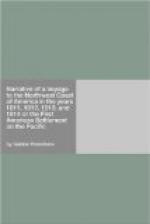On the 20th, we saw some elms—a tree that I had not seen hitherto, since my departure from Canada. We reached Fort Cumberland a little before the setting of the sun. This post, called in English Cumberland House, is situated at the outlet of the Saskatchawine, where it empties into English lake, between the 53d and 54th degrees of north latitude. It is a depot for those traders who are going to Slave lake or the Athabasca, or are returning thence, as well as for those destined for the Rocky mountains. It was under the orders of Mr. J.D. Campbell, who having gone down to Fort William, however, had left it in charge of a Mr. Harrison. There are two factories, as at Vermilion and la Montee. At this place the traders who resort every year to Fort William, leave their half-breed or Indian wives and families, as they can live here at little expense, the lake abounding in fish. Messrs. Clarke and Stuart, who were behind, arrived on the 22d, and in the evening we had a dance. They gave us four sacs of pemican, and we set off again, on the 23d, at eight A.M. We crossed the lake, and entered a small river, and having made some eighty or ninety miles under sail, encamped on a low shore, where the mosquitoes tormented us horribly all night.
On the 24th, we passed Muddy lake, and entered Lake Bourbon, where we fell in with a canoe from York factory, under the command of a Mr. Kennedy, clerk of the Hudson’s Bay Company. We collected some dozens of gulls’ eggs, on the rocky islands of the lake: and stopping on one of the last at night, having a little flour left, Mr. Decoigne and I amused ourselves in making fritters for the next day’s breakfast: an occupation, which despite the small amount of materials, employed us till we were surprised by the daybreak; the night being but brief at this season in that high latitude.
At sunrise on the 25th, we were again afloat, passed Lake Travers, or Cross lake, which empties into Lake Winipeg by a succession of rapids; shot down these cascades without accident, and arrived, toward noon, at the great rapid Ouenipic or Winipeg, which is about four miles long. We disembarked here, and the men worked down the canoes. At the foot of this rapid, which is the inlet of Winipeg, we found an old Canadian fisherman, who called himself King of the lake. He might fairly style himself king of the fish, which are abundant and which he alone enjoyed. Having made a boil, and regaled ourselves with excellent sturgeon, we left this old man, and entered the great lake Winipeg, which appeared to me like a sea of fresh water. This lake is now too well known to need a particular description: I will content myself with saying that it visibly yields in extent only to Lake Superior and Great Slave lake: it has for tributaries several large rivers, and among others the Saskatchawine, the Winipeg, in the east; and Red river in the south; and empties




